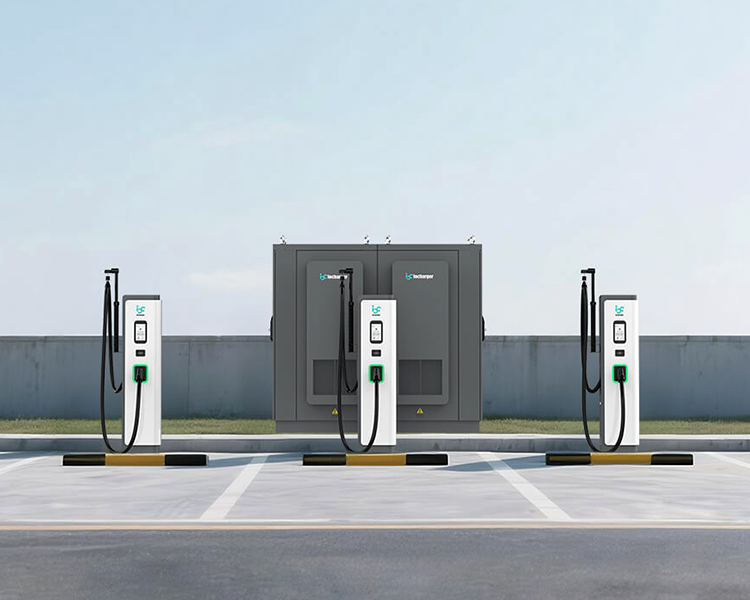
Европейская логистическая отрасль переходит в электрическое будущее. Перед операторами автопарков стоит важнейшая задача: как обеспечить эффективное питание тяжелых электрогрузовиков. Полагаться только на ночную зарядку в депо уже недостаточно. Реальным сдвигом в деле декарбонизации транспорта является модель спутниковых зарядных устройств, позволяющих быстро заряжать электромобили на маршруте. Такой подход жизненно важен для поддержания европейской торговли.
Пределы ночной зарядки
Большинство автопарков на этом этапе полагаются на зарядку в депо. Этот метод имеет ряд преимуществ. Грузовики могут подзаряжаться во время простоя, а операторы получают доступ к более низким внепиковым тарифам на электроэнергию. Этот метод подходит для автомобилей, курсирующих на короткие расстояния или работающих в малотоннажном режиме.
Однако дальнемагистральные грузовики сталкиваются с другой реальностью. Тяжелые автомобили, ежедневно преодолевающие сотни километров, потребляют огромное количество энергии. Полная ночная зарядка по стандартным тарифам автобазы может не восстановить достаточно энергии для поддержания автомобилей в движении в течение следующего дня. Это приводит к эксплуатационным ограничениям, снижению производительности и увеличению расходов, когда грузовики приходится выводить из эксплуатации для зарядки.
Дневная быстрая зарядка обеспечивает движение автопарка
Для достижения настоящей эффективности автопарка операторы должны сочетать зарядку в депо с быстрой зарядкой в дневное время. Именно здесь решающую роль играет мегаваттная зарядная система (MCS) со спутниковыми зарядными устройствами для EV.
Установив зарядные устройства в логистических центрах, портах и местах отдыха на трассах, автопарки смогут заправлять свои грузовики менее чем за час, обеспечивая непрерывную работу автомобилей без задержек.
Эта стратегия отражает инфраструктуру заправок, на которую сегодня опираются дизельные грузовики. Водители делают короткие остановки во время погрузки, разгрузки или обязательных перерывов на отдых. С помощью спутникового зарядного устройства MCS эти паузы превращаются в возможность увеличить запас хода на сотни километров.
Почему спутниковые зарядные устройства идеально подходят для логистики
В отличие от традиционных зарядных устройств, спутниковые зарядные устройства используют гибкий диспенсер, подключенный к централизованному силовому шкафу. Такая конфигурация позволяет операторам размещать несколько зарядных пунктов по всему двору, погрузочной платформе или сервисной площадке, без необходимости устанавливать отдельные шкафы в каждом месте. В результате получается экономичное решение, занимающее мало места и соответствующее динамичным операциям логистических центров.
Спутниковые системы также поддерживают масштабируемость. По мере роста парка операторы могут добавлять новые диспенсеры, не перестраивая всю электрическую инфраструктуру. Для портов, распределительных узлов и зон обслуживания автомагистралей такая адаптивность крайне важна для удовлетворения растущего спроса, поскольку на дорогах Европы появляется все больше электрических грузовиков.
Европейский контекст
Европейские правила AFIR еще больше усиливают эту потребность. Законодательство обязывает устанавливать мощные зарядные устройства через регулярные интервалы вдоль основных автомагистралей. Создание сети спутниковых зарядных устройств MCS - это наиболее разумный способ соблюдения требований. Это позволяет защитить инвестиции в инфраструктуру на будущее и поддержать трансграничную торговлю с помощью надежного коридора зарядки.
Почему стоит выбрать спутниковые решения iocharger MCS
Компания iocharger поставляет спутниковые зарядные устройства для EV нового поколения MCS, разработанные с учетом реалий логистики в тяжелых условиях. Их системы поддерживают выходную мощность на уровне мегаватта, что позволяет грузовикам быстро подзарядиться и вернуться на дорогу.
Благодаря гибкому размещению диспенсеров, прочной конструкции и соответствию последним международным стандартам, iocharger предлагает решения, которые легко вписываются в напряженную логистическую среду.

Основные преимущества спутниковых зарядных устройств для EV от Iocharger - MCS:
- Высокая плотность мощности для быстрой зарядки в дневное время.
- Масштабируемая конструкция, позволяющая расширить парк оборудования.
- Гибкая установка диспенсеров на логистических складах.
- Соответствие стандартам OCPP2.0.1 и ISO15118 Plug&Charge.
- Перспективная технология, соответствующая европейской дорожной карте устойчивого развития.
Баланс ночной и дневной зарядки для максимальной эффективности
Будущее электрических грузовиков в Европе не будет построено на одной стратегии зарядки. Вместо этого автопарки будут полагаться на гибридную модель: медленная зарядка в депо для ночного пополнения запасов, дополненная дневной спутниковой зарядкой MCS для обеспечения непрерывности работы.
Такой двойной подход обеспечивает постоянную готовность грузовиков, минимизируя время простоя и максимизируя прибыль от инвестиций. Для высокоинтенсивной логистики уже недостаточно полагаться только на зарядку в депо. Для обеспечения бесперебойной работы европейских цепочек поставок не хватает спутниковой зарядки в критических точках.
Узнайте, как Iocharger может обеспечить ваш переход. Изучите наш Мегаваттная зарядная система Спутниковое зарядное устройство DC EV Сегодня и создайте зарядную инфраструктуру будущего.
